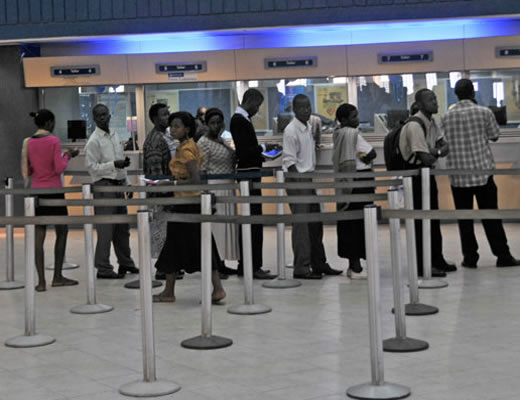Fitch Rating Agency says Nigerian banks will continue to face challenges this year, following an extremely difficult 2016. It said that “Regulatory capital ratios are high from a global perspective, but remain under pressure due to inflated risk-weighted assets and lower core retained earnings. In our view, there is a limited margin of safety as some banks could very easily breach minimum regulatory requirements in the event of further naira depreciation and/or weaker asset quality.” Nigerian Banks it said faced multiple threats from the operating environment in 2016, including Nigeria sliding into recession, the economy continuing to suffer from low oil prices and severe shortages of foreign currency (FC).
The rating Agency said “Consequently banks struggled with declining operating profitability, excluding translation gains, sluggish credit growth, fast asset quality deterioration, tight FC liquidity and weakening capitalisation, putting increasing pressure on their credit profiles.
“The outlook for the rest of 2017 is not much brighter. We believe that the banks will continue to face extremely tight FC liquidity despite the authorities’ best efforts to normalise the foreign-exchange interbank market and improve the supply of US dollars. Importantly, deliveries under the Central Bank of Nigeria’s (CBN) FX forward transactions since first half of 2016 have helped the banks access US dollars and reduce a large backlog of overdue trade finance obligations to international correspondent banks. “However, given the severity of the FC liquidity issues, refinancing risk remains at the top of our perceived risks for the sector, especially as some banks have large Eurobond maturities in 2017/2018. Fast asset quality deterioration is in line with our expectations given the macro challenges and the continuing issues in the oil-sector. Oil-related impaired loans (NPLs) are high and this excludes large volumes of restructured loans.
Continuing it said “Other industry sectors contributing to NPLs include general commerce and trading, which have been affected by both the naira depreciation and FC shortages. For the Fitch-rated banks, we believe the NPL ratio could rise to 10%-12% by end-first half of 2017 (this remains lower than the CBN’s reported figure for the entire sector). As a one-off policy change, the CBN allowed banks to write off all fully reserved NPLs by end-2016. Together with significant loan restructuring (particularly in the oil sector), this will ease pressure on NPLs for now, in our view.
“Slower economic growth and a lower risk appetite from banks will continue to translate into subdued credit growth and weak core earnings generation in 2017. Loan growth averaged 25 per cent in nine months of 2016, but this was due to the currency translation effect post devaluation as about half of sector loans are in FC. Loan growth was negligible in constant currency terms. The banks’ 2016 profitability was underpinned by large translation gains booked on net long FC positions following the naira devaluation. Excluding these, some banks would have reported a significant fall in operating income.
“Regulatory capital ratios are high from a global perspective, but remain under pressure due to inflated risk-weighted assets (due to the FC translation effect) and lower core retained earnings. In our view, there is a limited margin of safety as some banks could very easily breach minimum regulatory requirements in the event of further naira depreciation and/or weaker asset quality.
“The Long-Term IDRs of all banks’ are in the ‘B’ range, indicating highly speculative fundamental credit quality. The low ratings reflect the significant influence of the weak operating environment, which overshadows other rating factors. The banks’ IDRs are driven by their Viability Ratings, Fitch’s assessment of their standalone creditworthiness.
“Following a reassessment of potential sovereign support available to the banks in 2016, Fitch believes that sovereign support cannot be relied on given Nigeria’s (B+/Negative) weak ability to do so in FC. As a consequence, we removed sovereign support from the Long-Term IDRs. Overall, the largest Nigerian banks with stronger and more diverse business models, high revenue-generating capacity and stronger liquidity profiles appear to be coping better than smaller banks on most metrics. However, tail risks remain high for all banks due to their sensitivity to concentration risk.”











